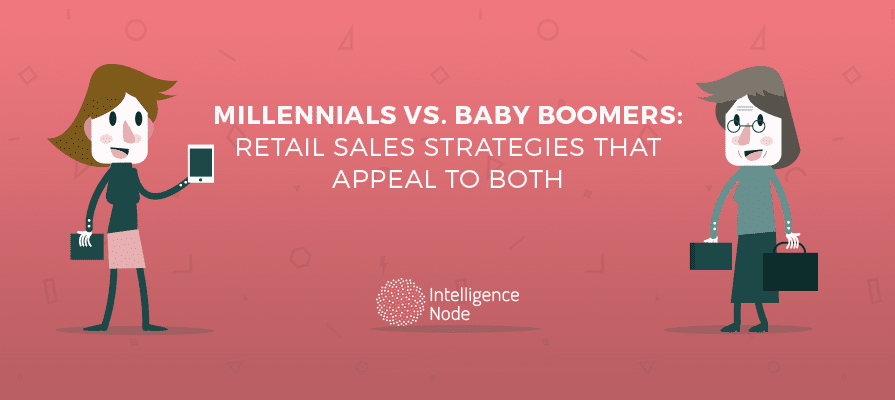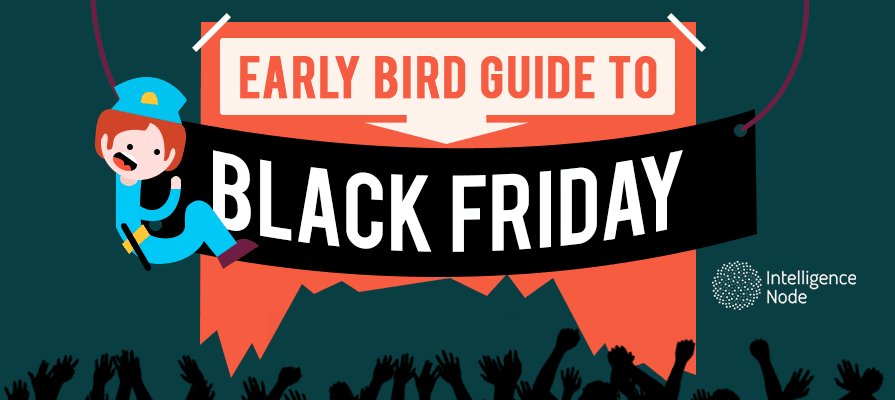For decades, marketers have spent every last cent they had tailoring their retail sales strategies to appeal to Baby Boomers. Boomers, once the largest generation, have now been overtaken by Millennials, who are the largest living segment of the population. Millennials, who are roughly ages 18-36, are the generation everyone loves to hate, dismissing them as lazy, whiny, and unwilling to work.
Don’t believe the negativity. Generations have always sniped at one another, and the negative Boomer opinion of Millennials is a mere repetition of this trend. Most negative beliefs about Millennials are untrue. So don’t allow the hype about the younger generation to cause you to neglect this important market segment.
Baby Boomers still spend the most money, but Millennials will eventually overtake them. To succeed, your retail sales strategies must include both generations. Doing so might even be easier than you think. Baby Boomers and Millennials might be locked in a generational war, but they share much in common that you can use to your brand’s advantage.
How Baby Boomers Spend Money
Baby Boomers are the most affluent generation, spending $230 billion in consumer goods. They were the first generation to widely invest in retirement accounts, and now those accounts are paying off. They were also raised by a generation that survived the Great Depression. This means that, while Baby Boomers can afford to spend money, many are reluctant to do so without a compelling reason. Your retail sales strategies must account for this discrepancy.
While mainstream media suggests that Millennials are the technology-addicted generation, research suggests otherwise. Boomers spend just as much time on digital media, and they watch more television.
So what do we know about how Baby Boomers spend money? Here are some insights from recent research:
- Boomers are planners who research their purchases in advance. They spend a lot of time online reading reviews and product information, so savvy retailers ensure a good experience and make product information readily available.
- Search engine advertisements are the single most effective online channel for marketing to Boomers.
- Television advertisements can still sway Boomers.
- Baby Boomers have an aspirational approach to retirement, believing that they will do and afford even more when they quit working.
- Baby Boomers are highly brand loyal. Reel them in and they’ll stick with you for life.
- Baby Boomers do not see themselves as old, and they retain the countercultural leanings of the sixties — even when they become politically conservative. Intelligent retail marketing strategies appeal to this independent spirit.
How Millennials Spend Money
Millennials came of age in the midst of a lagging economy, and many carry large debt loads. Consequently, Millennials tend to heavily focus on fulfillment and meaning. Research consistently shows that they care as much about a sense of purpose at work as they do about making money or receiving competitive benefits. The sluggish economy delayed Millennials’ ability to grow up, so many have delayed home buying, childrearing, and large purchases.
Despite the economic scale backs Millennials have faced, they’re beginning to come of age. Delaying big purchases means they have more disposable income for small purchases. They’d rather spend money on experiences than consumer goods, and are the main drivers of the experience economy. Here’s what else we know about their purchasing habits:
- Millennials may sacrifice more money for a positive experience or convenience. They spend 44% of their food budget on eating out.
- Millennials are skeptical of advertising, and may even grow to distrust brands that rely too much on traditional marketing.
- Trust is vital to earning their business. Most read blogs to learn about products, and many say that authenticity is more important than content.
- They see themselves as independent and strive for uniqueness. While Baby Boomers embraced the counterculture, Millennials have created dozens of micro-cultures. The much-derided hipster is just one manifestation of this trend.
What Baby Boomers and Millennials Have in Common
Millennials were raised by Boomers and internalized — or expanded upon — many of their values. The two generations may have more in common than they realize. Some of these commonalities include:
- A love of getting a good deal. Both are obsessed with sales, coupons, and bargain shopping.
- Women in both generations talk about their repurchases online more frequently than men do.
- An interest in service. Both Millennials and Boomers value customer service but may define good service differently.
- A willingness to take their time planning a purchase. Both groups research purchases, though Millennials are more likely to use mobile apps and Boomers are more likely to use search engines.
- They do not like being stereotyped but have long been victims of stereotyping.
Marketing to Different Generations
Your business doesn’t have to devise two separate marketing strategies targeting Baby Boomers and Millennials. Save time and money by targeting the similarities these two generations share. Some winning retail marketing strategies include:
- Broadening your web presence. Blogs, social media, search engine advertising, and profiles on major review sites help you target the ways both generations shop.
- Offering discounts and coupons. This is a great way to raise interest in your business and helps you effectively target a wide demographic that includes both generations.
- Providing a consistent brand experience. This taps into Baby Boomers’ brand loyalty and Millennials’ interest in authenticity.
- Offering an excellent shopping experience that includes world-class customer service. The service dimension will attract Boomers, while the experience will attract Millennials.
- Creating word of mouth campaigns. This builds trust since both Boomers and Millennials research their purchases.
- Responding quickly to negative reviews to avoid reputation damage.
- Appealing to consumers’ independence. Both Boomers and Millennials loathe a one size fits all approach.
- Treating both groups with respect. Millennials hate being labeled lazy or irresponsible, and Boomers do not want to hear that they are old. Avoid appealing to stereotypes.
- Presenting product information in a variety of media: through photos, clear and detailed descriptions, sponsored blog posts, and web communities.
- Rewarding loyalty and positive reviews. For example, you might offer a coupon code to consumers who leave a review. This builds trust for your product in both Millennials and Baby Boomers.




